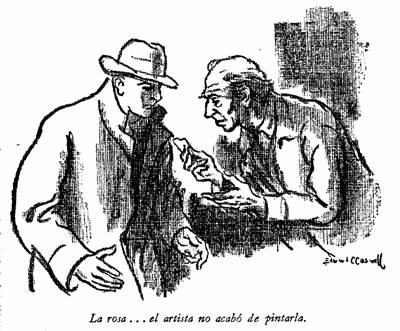–Perdóneme Vd., señorito –dijo José, recogiendo los pedazos de cristal.
En el rostro del viejo se veía pintada una terrible expresión de miedo.
–¿Qué tienes? –preguntó Grant.
–No tengo nada, señorito, nada.
–Pues bien, José, dime lo que pasa. Te lo ruego. El asunto ya es muy grave. Han matado a mi criado y me han robado una caja que pertenecía a tu amo. Dime todo lo que sepas,[1] ahora mismo. Es absolutamente necesario.
–Pero, señor Grant, yo no sé nada.
–Eso no es verdad, José. ¿Por qué tiemblas tanto? ¿Qué temes?
El pobre criado se pasó la lengua por los labios secos y haciendo un esfuerzo, confesó:
–Sí, hay algo. Al poner los ojos en el cristal, me acordé de un sueño.
–¿Con qué has soñado, José?
–Pues Vd. ha de saber, señorito –dijo el viejo lentamente –que este cristal cubría un cuadro. Reconozco estas líneas de color. Hacía muchos años que el cuadro colgaba de una pared en la habitación de mi amo. Desapareció hace más de tres meses,[2] un día antes de salir mi amo para la América del Norte. Yo creía que mi amo lo había guardado en alguna parte.
–Pues la caja que me entregó a mí estaba envuelta en papel verde.
–¿Era así de grande? –preguntó el viejo, indicando con las manos.
–Sí.
–Entonces sería[3] el cuadro lo que mi amo le entregó a Vd., señorito. Era el retrato de su madre, pintado por su tío Antonio. Hace ya varios años que éste vive[4] en los Estados Unidos.

–Pues bien. Esa caja envuelta en papel verde contenía el retrato de la madre del médico. Pero dime, ¿por qué me la han robado, matando a mi criado?
José se puso la mano sobre el corazón.
–Eso no lo sé, señorito. Lo único que sé es que una noche, hace una semana, soñé con el cuadro. Era un sueño terrible, señor Grant. Desde el día en que desapareció he soñado con él varias veces, pero aquella noche lo vi distintamente en sueños. . .y estaba cubierto de sangre.
–Será cosa de tu imaginación, José. Es muy fácil imaginar tales cosas después de un suceso violento –dijo Grant–. Pero el cuadro, ¿puedes describírmelo?
–La madre del doctor González era una mujer hermosísima, de rostro casi divino. En el cuadro parece estar riendo. En el pelo lleva una rosa.
–A juzgar por lo que me has dicho, José, el cuadro no tiene nada de particular.
–Espere Vd. Hay una cosita. . . pero no tendrá importancia. La rosa. . . el artista no acabó de pintarla. Se lo juro a Vd., señorito. La rosa que ella tiene en el pelo quedó incompleta. Falta la mitad, por lo menos; es decir, hay unas líneas muy delicadas, pero le falta el color.
[1] Dime . . . sepas, Tell me all that you know. The subjunctive is used in adjective (relative) clauses to indicate that the antecedent is indefinite or nonexistent.
[2] hace . . . meses, more than three months ago.
[3] sería, it probably was. The conditional and conditional perfect are used to express probability or conjecture with reference to past time.
[4] Hace . . . vive, For several years now the latter has been living.
Exercises
A. Memorize.
- acordarse de un sueño – to remember a dream
- ahora mismo – right now
- asi de grande – so big
- en sueños – in (my, your, etc.) dreams
- es decir – that is to say
- nada de particular – nothing distinctive, special
- pues bien – well then
- ¿Qué tienes? – What’s the matter with you?
- soñar con – to dream of
B. Subjunctive in dependent noun clauses (after expressions of will, desire, emotion, and uncertainty; after certain impersonal expressions).
- I want you to tell me who killed Emmanuel.
- I told him to bring me the box.
- I do not believe that Joseph will recognize you.
- I hope you know where the picture is.
- I regret that the doctor has not returned.
- I begged him to tell me what had happened.
- It is necessary that you leave right now.
- It is possible that the doctor has put the picture away somewhere.
C. Translate.
- Well then, look at the old man’s face.
- My, what an expression of fear!
- What is the matter with him now?
- He says that there isn’t anything the matter with him.
- To whom does the portrait belong that they stole from you?
- Why do you ask me (it)?
- I am curious (curiosity pricks me), since I have never seen it.
- There isn’t anything distinctive about it.
- Then why has Joseph dreamed of it so many times?
- Perhaps because it used to hang from the wall of his master’s bedroom.
- It disappeared one day before the doctor left for North America; that is to say, several months ago.
- They say that the portrait lacks something.
- I remember the rose that the artist left incomplete.
- Joseph tells me that when he saw it in his dreams it was so big.
- To judge by what he has said, the picture probably has no importance.
- Perhaps not, but the matter is very serious.
- It seems to me that those lines of blue and gold have more importance.
- Emmanuel died without saying anything to anybody.
Click to Add the First »
